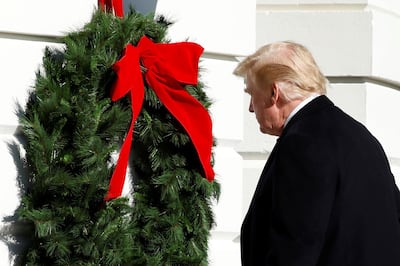With the smoke finally clearing from one of the most dangerous and divisive chapters in US political history, Americans are starting to survey the wreckage and assess the damage.
The sad saga of the 2020 election is effectively over. Outgoing President Donald Trump has no plausible path to block the certification and formalisation of President-elect Joe Biden's victory.
At non on January 20, 2021 Mr Biden will be inaugurated and the Trump administration will be a thing of the past.
The story of the past four years and especially the past four weeks has been an extraordinary stress-test for the institutional infrastructure of the American system. It seems to have held together but its profound vulnerabilities have been exposed as never before.
So the question now is, was the outcome reassuring or alarming? Is the constitutional glass half-full or half-empty?
Any answer can only be tentative because dynamics are still unfolding and there is so much compelling evidence on both sides of the argument.
A positive case would concede that for the first time a remarkably unsuited individual, who had no regard for the fundamental logic of the democratic system ascended to the presidency.
And while the other guardrails put in place by the framers of the Constitution – particularly the Senate's refusal to hold a meaningful impeachment trial or seriously examine the evidence presented by the House of Representatives – generally proved ineffective, the ultimate check, the will of the voters in a national election, prevailed and blocked a dramatic slide towards authoritarianism.
This case would add that it is perhaps unrealistic to expect a political procedure such as an impeachment trial not to be determined by the partisan interests of duly elected officials and that is part of the anticipated process.
It would note that some of Mr Trump's worst excesses were blocked by courts, the Congress or even his own officials, and that many of his more controversial actions will be reversible by Mr Biden, in some cases fairly easily.
The positive argument would dwell on the November 3 election. None of the nightmare scenarios anticipated beforehand played out. State and local officials throughout the country, Republicans and Democrats alike, worked diligently, honestly and often together to ensure a free and fair vote with the highest participation rate in over a century.
In the midst of the coronavirus pandemic and given the large number of other significant obstacles, the US held one of its best elections in modern history. The election security agency of Mr Trump's own administration called it "the most secure in American history," with “no evidence” of any votes being tampered with or “in any way compromised.”
State officials, including diehard Republicans, have refused to intervene to help Mr Trump remain president even though he lost. Courts, too, including those dominated by Republicans and even his own appointees, have dismissed his efforts to invalidate huge numbers of votes based on spurious technicalities.
Mr Trump may have been a potentially dangerous president, it would conclude, but the real test was whether he could avoid being voted out of office. The answer is a resounding no. And indeed, all his efforts to change or ignore the outcome and stay in power failed completely.
US democracy has triumphed, this positive narrative concludes, because it proved far stronger than was widely feared.
There is another, negative interpretation of the same set of facts that highlights the inadequacies that have been exposed.
If the only effective guardrail against a president who disregards the norms that undergird democracy is a quadrennial election, then that system is so vulnerable as to be fundamentally broken. Mr Trump proved that existing checks on executive power are insufficient.
No matter how badly the president is behaving, Congress apparently will only act in a partisan and not an institutional manner. Courts, too, have limited their own authority.
And this administration argued the president is literally above the law and, while in office, cannot be investigated, let alone indicted, for any unlawful act.
Even the election is not really a good-news story, according to this narrative. It would note that a couple of hundred thousand, or even less, flipped votes in key areas would have given Mr Trump another electoral college victory, despite a massive popular vote defeat and what a second term might have meant.
It would highlight Mr Trump's considerable support, his refusal to concede, his conspiracy theories and verbal attacks on the election and the American democratic system itself, endorsed by most leading Republicans – except the officials who oversaw the election process.
Before November 3, Mr Trump was more against the election than his opponent, and now most of the Republican Party has joined him in an ongoing campaign against the election and implicitly, the entire system.
Plainly if Mr Trump had found a way to invalidate the results, he would have done so. All evidence suggests that most leading national Republicans would have supported that.
Plausible nightmare scenarios illustrated how many gaps and ambiguities would have plagued the system in the event of a closer outcome.
So, the glass half-empty narrative would emphasize how close the US democratic system came to collapse and how easily it might in the future, especially with growing Republican indifference or even antipathy to its basic structures.
On balance, the alarmist argument is far more persuasive.
If proponents of the ongoing strength of the US democratic system can point at best to a half-full glass, the institutional structures are at grave risk.
The last remaining guardrail, the national election, held. But since that is probably because the result was not closer, within "cheating distance,” and only a few small changes could have brought that guardrail crashing down as well, anyone who is not deeply alarmed is not paying close enough attention.
Hussein Ibish is a senior resident scholar at the Arab Gulf States Institute and a US affairs columnist for The National




